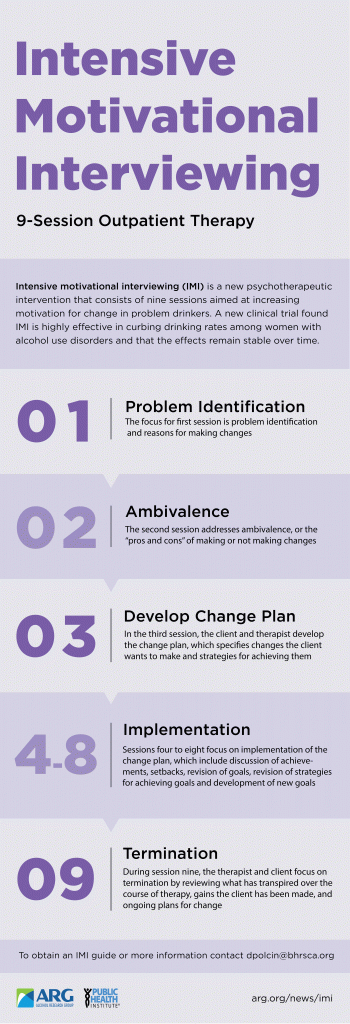
Press Release
New Treatment Program Helps Women Significantly Reduce How Much They Drink After Treatment Ends
-
Focus Areas
Alcohol, Tobacco, Drugs & Mental Health -
Issues
Alcohol

A new clinical trial shows that intensive motivational interviewing (IMI), an intervention that was first used to treat methamphetamine dependence, is highly effective in curbing how much women with alcohol problems drank two months after the program ended with consumption levels sustained at the six-month follow-up. Women who were heavy drinkers experienced the greatest effect. Heavy drinking was defined as drinking 14 or more days to the point of intoxication over the past 30 days.
 The study from the Alcohol Research Group (ARG), a program of the Public Health Institute, found that IMI produced fewer drinking days and fewer heavy drinking days than the comparison group with trend analysis indicating that the effect would most likely be sustained long term. Other treatment programs have shown only minor to moderate effects that decline over time.
The study from the Alcohol Research Group (ARG), a program of the Public Health Institute, found that IMI produced fewer drinking days and fewer heavy drinking days than the comparison group with trend analysis indicating that the effect would most likely be sustained long term. Other treatment programs have shown only minor to moderate effects that decline over time.
Previous research has demonstrated that women suffer more adverse consequences from problem drinking than men, including more severe health and social problems. Women also progress more quickly from the first time they drink to the development of alcohol-related issues to the need for treatment. Despite these more harmful effects, there is little research on what types of alcohol treatment programs work best for women.
IMI offers a promising intervention that can work on its own without the need for long term case management or consumption monitoring after treatment ends. Participants in the IMI group received nine sessions with a trained therapist who helped participants identify changes they wanted to make and develop strategies to implement those changes. Having more sessions than a single session offered by traditional motivational interviewing provided participants more time to test their change plan and to modify it, revise strategies, and reset goals, as needed.
“In working with women in recovery, we found they have very distinct needs that a treatment program should address in order to be successful,” said Douglas Polcin, Ed.D, principal investigator, senior scientist at ARG, and originator of IMI. “These needs include ways to navigate relationship problems, parenting issues, and personal trauma, while building self-efficacy and self-esteem.”
IMI provides enough focus on the individual yet is brief enough to be feasible and acceptable as an outpatient intervention. Results showed that 80 percent of women in the IMI group completed seven to nine sessions, a higher attendance than most treatment programs where a 50 percent dropout rate within the first month is the norm.
“IMI is unique in that it offers a treatment protocol that participants found fit within their busy lives and at the same time provides greater support across a range of issues to help them meet and sustain their goals over the long term.”
Essentially, IMI meets women where they’re at.
The study randomized 215 women: 107 received IMI and 108 were assigned to the control group which received a single session of motivational interviewing along with weekly support groups to ensure participants across both groups had an equal number of treatment hours. Data was collected at an outpatient treatment program in Northern California. The study was published today in the Journal of Psychoactive Drugs.
###
Polcin, D.L., Nayak, M.B., Korcha, R., Pugh, S., Witbrodt, J., Salinardi, M., Galloway, G., Nelson, E. (2019). Randomized clinical trial of Intensive Motivational Interviewing for women: 6-month outcomes. Journal of Psychoactive Drugs
Support for this paper was provided by the National Institute on Alcohol Abuse and Alcoholism under award number R01AA22857 (Polcin). The content is solely the responsibility of the authors and does not necessarily represent the official views of NIAAA or the National Institutes of Health.
We also acknowledge the support of the New Leaf Treatment Center in Lafayette, CA and the women who participated in the study.
If you are interested in arranging an interview with Douglas Polcin, Ph.D., please contact Diane Schmidt, senior communications & development specialist, at (510) 898-5819 or dschmidt@arg.org.
More Updates
Work With Us
You change the world. We do the rest. Explore fiscal sponsorship at PHI.
Support Us
Together, we can accelerate our response to public health’s most critical issues.
Find Employment
Begin your career at the Public Health Institute.



